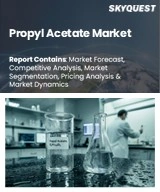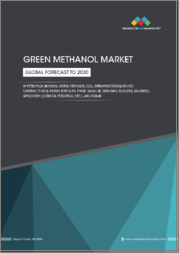
|
시장보고서
상품코드
1446987
디메틸에테르 시장 예측(-2030년) : 원료별, 용도별, 지역별 세계 분석Dimethyl Ether Market Forecasts to 2030 - Global Analysis By Raw Material (Bio Based, Fossil Fuel Based and Other Raw Materials), Application, and By Geography |
||||||
Stratistics MRC에 따르면, 세계 디메틸에테르 시장은 2023년 57억 달러로 예측 기간 동안 14.4%의 CAGR로 성장하여 2030년에는 147억 달러에 달할 것으로 예상됩니다.
디메틸에테르(DME)는 희미한 에테르 냄새가 나는 무색 가스입니다. 화학적으로는 산소 원자에 결합 된 두 개의 메틸 그룹으로 구성되며, DME는 일반적으로 에어로졸 추진제, 냉매 및 청정 대체 연료로 사용되며, DME는 물 분자를 제거하는 메탄올의 탈수 반응에 의해 생산됩니다. 독성이 낮고 생분해성이 있어 환경 친화적이며, DME의 특성으로 인해 DME는 청정 대체 에너지를 찾는 다양한 산업에 적용될 수 있는 다재다능한 화합물입니다.
중국 국가통계국에 따르면 2022년 1-10월 액화석유가스 생산량은 41,071 킬로톤으로 전년 동기 40,009 킬로톤에 비해 증가했습니다.
에너지 안보와 다각화
DME는 천연가스, 석탄, 바이오매스, 재생에너지 등 다양한 원료에서 생산할 수 있는 다양한 에너지원을 제공합니다. 이러한 다양성은 단일 에너지원에 대한 의존도를 낮추고, 공급망의 위험과 취약성을 완화하여 에너지 안보를 강화합니다. 또한, 다양한 원료로부터의 생산은 에너지 포트폴리오를 다양화하는데 도움이 되며, 이는 이 시장을 더욱 견인하고 있습니다.
높은 비용
천연가스나 석탄을 DME로 전환하기 위해서는 특수한 설비와 에너지 집약적인 공정이 필요하며, 이는 전체 생산 비용의 한 요인으로 작용합니다. 규모의 경제가 제한적이기 때문에 인프라 및 운영 비용이 적은 생산량에 분산되어 생산 비용이 높습니다. 또한, 원료의 가용성과 접근성 또한 DME 시장의 비용에 영향을 미칩니다.
기술의 발전
천연가스, 석탄, 바이오매스, 재생 가능 자원 등 다양한 원료로부터 DME 합성을 강화하는 혁신적인 기술이 지속적으로 개발되고 있습니다. 합성 가스 발효 및 바이오 메탄올 합성과 같은 공정은 DME를 생산할 수 있는 지속가능한 경로를 제공하여 세계 지속가능성 목표에 부합하고 화석 연료에 대한 의존도를 줄임으로써 다양한 분야에서의 수용과 채택을 촉진하고 있습니다.
제한적인 소비자 인식
DME는 휘발유나 디젤과 같은 기존 연료에 비해 일반 소비자에게는 아직 잘 알려져 있지 않습니다. 주유소나 유통망과 같은 DME 인프라의 가용성과 접근성은 제한적입니다. 또한, 인프라가 충분히 구축되지 않으면 소비자들은 DME로 구동되는 자동차나 가전제품에 대한 투자를 주저할 수 있으며, 이는 소비자 인지도를 더욱 떨어뜨리는 요인으로 작용하고 있습니다.
COVID-19의 영향
COVID-19 팬데믹은 디메틸에테르(DME) 시장에 여러 가지 부정적인 영향을 미쳐 공급망을 혼란에 빠뜨리고 수요를 감소시키며 투자 결정에 영향을 미쳤습니다. 팬데믹으로 인한 경기 둔화는 산업 활동과 운송의 감소로 이어졌고, 그 결과 다양한 부문에서 DME 소비가 감소했습니다. 또한, 물류 및 운송 지연은 공급망 문제를 더욱 악화시켜 공급 부족과 비용 증가로 이어져 이 시장의 발목을 잡고 있습니다.
예측 기간 동안 화석 연료 기반 부문이 가장 큰 비중을 차지할 것으로 예상
화석연료 기반 부문은 기존 탄화수소 연료, 특히 디젤을 대체할 수 있는 유망한 연료로 작용하기 때문에 가장 큰 점유율을 차지할 것으로 추정됩니다. 석탄과 천연가스를 원료로 하는 DME는 먼저 이들 화석연료를 수소와 일산화탄소의 조합인 합성가스로 전환한 후, 메탄올을 합성하고 마지막으로 탈수하여 DME를 생산합니다. 또한, 청정 연소 특성은 강화된 배기가스 규제에 부합하여 대기 환경 개선을 목표로 하는 지역에서의 채택을 촉진하여 이 부문의 확장을 촉진하고 있습니다.
LPG 혼합 부문은 예측 기간 동안 가장 높은 CAGR을 기록할 것으로 예상
LPG 혼합 부문은 예측 기간 동안 가장 높은 CAGR을 보일 것으로 예상되며, LPG는 주로 프로판과 부탄으로 구성되어 요리, 난방 및 운송에 널리 사용되며, DME를 LPG에 혼합하면 기화 및 연소 안정성 향상과 같은 연소 특성을 향상시킬 수 있습니다. 또한, 이러한 혼합은 더 깨끗하고 지속가능한 에너지원으로 전환하려는 전 세계의 노력과 일치하여 이 부문의 성장을 촉진하고 있습니다.
가장 큰 점유율을 차지하는 지역
추정 기간 동안 아시아태평양이 가장 큰 시장 점유율을 차지했습니다. 이 지역은 산업화, 도시화, 인구가 급속히 증가하면서 에너지 및 대체 연료에 대한 수요가 증가하고 있습니다. 중국, 일본, 인도와 같은 국가들은 청정 연소 연료로서의 잠재력을 활용하기 위해 DME 생산 인프라와 기술 개발에 투자하고 있습니다. 또한, 청정 에너지 솔루션을 촉진하는 이니셔티브, 엄격한 배출 규제, 대체 연료를 위한 운송 인프라 구축은 이 지역에서 DME의 채택을 촉진하고 있습니다.
CAGR이 가장 높은 지역:
유럽은 규제와 지속가능한 에너지 솔루션에 대한 관심 증가 등 다양한 요인으로 인해 예측 기간 동안 가장 높은 CAGR을 기록할 것으로 예상됩니다. 미쓰비시상사, Akzo Nobel N.V., 한국가스공사 등 주요 기업들은 특히 수송 및 난방 분야에서 청정 대체 연료로 DME의 채택을 늘리고 있습니다. 또한, 진화하는 에너지 환경은 유리한 규제 환경과 기술 혁신과 함께 이 지역의 DME 시장 성장에 박차를 가하고 있습니다.
무료 커스터마이징 서비스
이 보고서를 구독하는 고객은 다음과 같은 무료 맞춤화 옵션 중 하나를 사용할 수 있습니다:
- 기업 개요
- 추가 시장 기업의 종합적인 프로파일링(최대 3개사까지)
- 주요 기업 SWOT 분석(최대 3개사)
- 지역 세분화
- 고객의 관심에 따른 주요 국가별 시장 추정치, 예측, CAGR(주: 타당성 검토에 따른)
- 경쟁사 벤치마킹
- 제품 포트폴리오, 지리적 입지, 전략적 제휴를 기반으로 한 주요 기업 벤치마킹
목차
제1장 주요 요약
제2장 서문
- 개요
- 이해관계자
- 조사 범위
- 조사 방법
- 데이터 마이닝
- 데이터 분석
- 데이터 검증
- 조사 접근법
- 조사 소스
- 1차 조사 소스
- 2차 조사 소스
- 가정
제3장 시장 동향 분석
- 성장 촉진요인
- 성장 억제요인
- 기회
- 위협
- 용도 분석
- 신흥 시장
- 신종 코로나바이러스 감염증(COVID-19)의 영향
제4장 Porter's Five Forces 분석
- 공급 기업의 교섭력
- 구매자의 교섭력
- 대체품의 위협
- 신규 참여업체의 위협
- 경쟁 기업 간의 경쟁 관계
제5장 세계의 디메틸에테르 시장 : 원재료별
- 바이오 기반
- 화석연료 기반
- 천연가스
- 석탄
- 메탄올
- 기타 원재료
제6장 세계의 디메틸에테르 시장 : 용도별
- 산업용
- 에어로졸 추진제
- LPG 혼합
- 수송용 연료
제7장 세계의 디메틸에테르 시장 : 지역별
- 북미
- 미국
- 캐나다
- 멕시코
- 유럽
- 독일
- 영국
- 이탈리아
- 프랑스
- 스페인
- 기타 유럽
- 아시아태평양
- 일본
- 중국
- 인도
- 호주
- 뉴질랜드
- 한국
- 기타 아시아태평양
- 남미
- 아르헨티나
- 브라질
- 칠레
- 기타 남미
- 중동 및 아프리카
- 사우디아라비아
- 아랍에미리트
- 카타르
- 남아프리카공화국
- 기타 중동 및 아프리카
제8장 주요 발전
- 계약, 파트너십, 협업, 합작투자
- 인수와 합병
- 신제품 발매
- 사업 확대
- 기타 주요 전략
제9장 기업 개요
- China Energy Limited
- Akzo Nobel N.V.
- The Chemours Company
- Jiutai Energy Group
- Zagros Petrochemical Company
- Oberon Fuels
- Mitsubishi Corporation
- Grillo Werke AG
- Royal Dutch Shell PLC
- Ferrostaal GmbH
According to Stratistics MRC, the Global Dimethyl Ether Market is accounted for $5.7 billion in 2023 and is expected to reach $14.7 billion by 2030 growing at a CAGR of 14.4% during the forecast period. Dimethyl ether (DME) is a colorless gas with a faint ethereal odor. Chemically, it consists of two methyl groups attached to an oxygen atom. It's commonly used as an aerosol propellant, refrigerant, and as a clean-burning alternative fuel. DME is produced through the dehydration of methanol, a process that involves removing water molecules. It exhibits low toxicity and is biodegradable, making it environmentally friendly. DME's properties make it a versatile compound with potential applications in various industries seeking cleaner energy alternatives.
According to the National Bureau of Statistics of China, the cumulative value of liquefied petroleum gas production in the first ten months of 2022 accounted for 41,071 kilotons, compared to 40,009 kilotons during the same period in the previous year.
Market Dynamics:
Driver:
Energy security and diversification
DME offers a diversified energy source that can be produced from a wide range of feedstocks, including natural gas, coal, biomass, and renewable sources. This versatility reduces reliance on a single energy source, enhancing energy security by mitigating supply chain risks and vulnerabilities. Moreover, production from diverse feedstocks helps to diversify energy portfolios, which is driving this market further.
Restraint:
High cost
The conversion of natural gas or coal into DME requires specialized equipment and energy-intensive processes, which contribute to the overall production costs. Limited economies of scale result in higher production costs as infrastructure and operational expenses are distributed over a smaller output volume. In addition, the availability and accessibility of raw materials also impact the cost of the DME market.
Opportunity:
Technological advancements
Innovative technologies are continually being developed to enhance DME synthesis from various feedstocks, including natural gas, coal, biomass, and renewable sources. Processes like syngas fermentation and bio-methanol synthesis offer sustainable pathways to produce DME, aligning with global sustainability goals and reducing reliance on fossil fuels, driving its acceptance and adoption across various sectors.
Threat:
Limited consumer awareness
Compared to well-established fuels like gasoline and diesel, DME is still relatively unknown to the general public. The availability and accessibility of DME infrastructure, such as refueling stations or distribution networks, have been limited. Furthermore, without a well-developed infrastructure, consumers may be hesitant to invest in DME-powered vehicles or appliances, further contributing to the limited consumer awareness.
Covid-19 Impact
The COVID-19 pandemic has had several negative impacts on the Dimethyl Ether (DME) market, disrupting supply chains, reducing demand, and affecting investment decisions. The pandemic-induced economic slowdown led to decreased industrial activity and transportation, resulting in a decline in DME consumption across various sectors. Furthermore, delays in logistics and transportation further exacerbated supply chain challenges, leading to supply shortages and increased costs, thereby hampering this market.
The fossil fuel based segment is expected to be the largest during the forecast period
The fossil fuel based segment is estimated to hold the largest share because it serves as a promising alternative to traditional hydrocarbon fuels, particularly diesel. Originating from coal or natural gas, DME is produced by first turning these fossil fuels into syngas, which is a combination of hydrogen and carbon monoxide; subsequently, methanol is synthesized; and finally, the product is dehydrated to produce DME. Additionally, its clean-burning characteristics align with tightening emissions regulations, fostering its adoption in regions aiming to improve air quality, which is driving this segment's expansion.
The LPG blending segment is expected to have the highest CAGR during the forecast period
The LPG blending segment is anticipated to have highest CAGR during the forecast period. LPG, primarily composed of propane and butane, is widely used for cooking, heating, and transportation. By blending DME with LPG, the resulting fuel gains enhanced combustion characteristics, including improved vaporization and combustion stability. Furthermore, this blending aligns with global efforts to transition towards cleaner and more sustainable energy sources, which thereby boosts this segment's growth.
Region with largest share:
Asia Pacific commanded the largest market share during the extrapolated period. This region boasts significant industrialization, urbanization, and a burgeoning population, which has led to a rising demand for energy and fuel alternatives. Countries like China, Japan, and India are investing in DME production infrastructure and technology development to capitalize on its potential as a clean-burning fuel. In addition, initiatives promoting cleaner energy solutions, stringent emissions regulations, and the development of transportation infrastructure for alternative fuels are driving the adoption of DME in the region.
Region with highest CAGR:
Europe is expected to witness highest CAGR over the projection period, owing to various factors, including regulatory initiatives and an increasing focus on sustainable energy solutions. Key players such as Mitsubishi Corporation, Akzo Nobel N.V., and Korea Gas Corporation are increasingly embracing DME as a clean-burning alternative fuel, particularly in transportation and heating applications. Moreover, the evolving energy landscape, coupled with favorable regulatory frameworks and technological innovations, is fueling the growth of the DME market in the region.
Key players in the market
Some of the key players in the Dimethyl Ether Market include China Energy Limited, Akzo Nobel N.V., The Chemours Company, Jiutai Energy Group, Zagros Petrochemical Company, Oberon Fuels, Mitsubishi Corporation, Grillo Werke AG, Royal Dutch Shell PLC and Ferrostaal GmbH.
Key Developments:
In January 2024, Mitsubishi Corporation (MC) is pleased to announce that Isuzu Motors Ltd. (Isuzu) became a new signatory to an agreement previously reached by MC and four other interests to collaborate on digital transformations (DX) in regional public transportation.
In January 2024, Shell has reached an agreement to sell its Nigerian onshore subsidiary The Shell Petroleum Development Company of Nigeria Limited (SPDC) to Renaissance, a consortium of five companies comprising four exploration and production companies based in Nigeria and an international energy group.
Raw Materials Covered:
- Bio Based
- Fossil Fuel Based
- Other Raw Materials
Applications Covered:
- Industrial
- Aerosol Propellant
- LPG Blending
- Transportation Fuel
Regions Covered:
- North America
- US
- Canada
- Mexico
- Europe
- Germany
- UK
- Italy
- France
- Spain
- Rest of Europe
- Asia Pacific
- Japan
- China
- India
- Australia
- New Zealand
- South Korea
- Rest of Asia Pacific
- South America
- Argentina
- Brazil
- Chile
- Rest of South America
- Middle East & Africa
- Saudi Arabia
- UAE
- Qatar
- South Africa
- Rest of Middle East & Africa
What our report offers:
- Market share assessments for the regional and country-level segments
- Strategic recommendations for the new entrants
- Covers Market data for the years 2021, 2022, 2023, 2026, and 2030
- Market Trends (Drivers, Constraints, Opportunities, Threats, Challenges, Investment Opportunities, and recommendations)
- Strategic recommendations in key business segments based on the market estimations
- Competitive landscaping mapping the key common trends
- Company profiling with detailed strategies, financials, and recent developments
- Supply chain trends mapping the latest technological advancements
Free Customization Offerings:
All the customers of this report will be entitled to receive one of the following free customization options:
- Company Profiling
- Comprehensive profiling of additional market players (up to 3)
- SWOT Analysis of key players (up to 3)
- Regional Segmentation
- Market estimations, Forecasts and CAGR of any prominent country as per the client's interest (Note: Depends on feasibility check)
- Competitive Benchmarking
- Benchmarking of key players based on product portfolio, geographical presence, and strategic alliances
Table of Contents
1 Executive Summary
2 Preface
- 2.1 Abstract
- 2.2 Stake Holders
- 2.3 Research Scope
- 2.4 Research Methodology
- 2.4.1 Data Mining
- 2.4.2 Data Analysis
- 2.4.3 Data Validation
- 2.4.4 Research Approach
- 2.5 Research Sources
- 2.5.1 Primary Research Sources
- 2.5.2 Secondary Research Sources
- 2.5.3 Assumptions
3 Market Trend Analysis
- 3.1 Introduction
- 3.2 Drivers
- 3.3 Restraints
- 3.4 Opportunities
- 3.5 Threats
- 3.6 Application Analysis
- 3.7 Emerging Markets
- 3.8 Impact of Covid-19
4 Porters Five Force Analysis
- 4.1 Bargaining power of suppliers
- 4.2 Bargaining power of buyers
- 4.3 Threat of substitutes
- 4.4 Threat of new entrants
- 4.5 Competitive rivalry
5 Global Dimethyl Ether Market, By Raw Material
- 5.1 Introduction
- 5.2 Bio Based
- 5.3 Fossil Fuel Based
- 5.3.1 Natural Gas
- 5.3.2 Coal
- 5.3.3 Methanol
- 5.4 Other Raw Materials
6 Global Dimethyl Ether Market, By Application
- 6.1 Introduction
- 6.2 Industrial
- 6.3 Aerosol Propellant
- 6.4 LPG Blending
- 6.5 Transportation Fuel
7 Global Dimethyl Ether Market, By Geography
- 7.1 Introduction
- 7.2 North America
- 7.2.1 US
- 7.2.2 Canada
- 7.2.3 Mexico
- 7.3 Europe
- 7.3.1 Germany
- 7.3.2 UK
- 7.3.3 Italy
- 7.3.4 France
- 7.3.5 Spain
- 7.3.6 Rest of Europe
- 7.4 Asia Pacific
- 7.4.1 Japan
- 7.4.2 China
- 7.4.3 India
- 7.4.4 Australia
- 7.4.5 New Zealand
- 7.4.6 South Korea
- 7.4.7 Rest of Asia Pacific
- 7.5 South America
- 7.5.1 Argentina
- 7.5.2 Brazil
- 7.5.3 Chile
- 7.5.4 Rest of South America
- 7.6 Middle East & Africa
- 7.6.1 Saudi Arabia
- 7.6.2 UAE
- 7.6.3 Qatar
- 7.6.4 South Africa
- 7.6.5 Rest of Middle East & Africa
8 Key Developments
- 8.1 Agreements, Partnerships, Collaborations and Joint Ventures
- 8.2 Acquisitions & Mergers
- 8.3 New Product Launch
- 8.4 Expansions
- 8.5 Other Key Strategies
9 Company Profiling
- 9.1 China Energy Limited
- 9.2 Akzo Nobel N.V.
- 9.3 The Chemours Company
- 9.4 Jiutai Energy Group
- 9.5 Zagros Petrochemical Company
- 9.6 Oberon Fuels
- 9.7 Mitsubishi Corporation
- 9.8 Grillo Werke AG
- 9.9 Royal Dutch Shell PLC
- 9.10 Ferrostaal GmbH



















